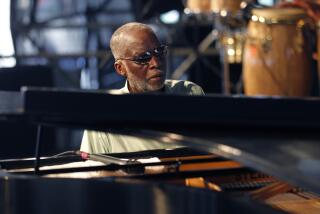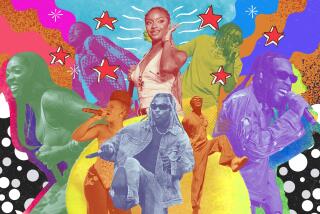Ibrahim’s Glimpse Past Apartheid : South Africa: Jazz pianist leading exiled musicians back home to perform.
- Share via
JOHANNESBURG, South Africa — Each time Abdullah Ibrahim sits down at the piano to play jazz, his South African audience gets a glimpse of life beyond apartheid.
The sight--familiar enough in the clubs of New York--of the tall, willowy figure dressed in flowing white robes has been denied them for many years.
Like many other South African musicians, writers and artists, Ibrahim, better known here as Dollar Brand, left the land of his birth to escape the apartheid laws that discriminated against him because of the color of his skin.
Now that apartheid is finally crumbling he is back, the first of a flood of returning musicians to perform at home.
“We discussed this among the musicians, and everyone agreed it was the right time to come,” he told a news conference last month, after returning to South Africa.
Even as he spoke, another of South Africa’s famous sons, jazz trumpeter Hugh Masekela, arrived in Johannesburg.
Yet Ibrahim, who said he was here to pave the way for a mass concert of exiled musicians in November, has upset some anti-apartheid activists with his series of sell-out concerts.
Despite reforms set in motion by President Frederik W. de Klerk, a cultural boycott against Pretoria is still in place, and some people felt Ibrahim should have waited for the November event.
The ebullient Ibrahim, who has the blessing of the African National Congress, dismissed the controversy as a misunderstanding.
“He used to be known as Africa’s best pianist,” said ANC information chief Pallo Jordan, himself a former exile and a friend of Ibrahim.
“But he’s more modest now,” he added with a smile.
Ibrahim, 56, admits that going into exile was as much a career move as a political one.
“Apartheid made it virtually impossible to function as a creative artist. It was a career move. We had to leave the country because of apartheid,” he said.
His band, the Jazz Epistles, formed with Masekela and saxophonist Kippie Moeketsi, had hit the top of the domestic market by the time the trio went abroad in 1962.
They sought sanctuary in Switzerland from the turmoil that erupted at home after police killed 69 blacks in Sharpeville township in 1960.
They got a crucial break at a concert in Zurich. Duke Ellington was in the audience, and he liked them so much that he sponsored their first American album--”Duke Ellington Presents the Dollar Brand Trio.”
Ibrahim’s original name was Adolphus Brand, but he picked up the nickname Dollar from the black American seamen who sold him jazz records when they docked in his native Cape Town.
At Ellington’s urging, he went to the United States in 1965. There he involved himself with the free, or abstract, jazz scene, playing with musicians such as John Coltrane and Ornette Coleman.
Three years later, he converted to Islam, changing his name to Abdullah Ibrahim.
“I went through all of this stuff--yoga, Buddhism. . . . For me it landed with Islam, especially because of its accessibility in the Cape,” he said.
In the mid-1980s, he formed a seven-piece ensemble called Ekaya, which means home in several southern African languages. The group dedicated its work to the people of South Africa living under apartheid.
Ibrahim believes he can contribute to a new South Africa by passing on to black musicians the marketing skills he has learned abroad.
“The most important skills are networking skills, so that musicians can learn to sell their own songs.”
More to Read
Sign up for Essential California
The most important California stories and recommendations in your inbox every morning.
You may occasionally receive promotional content from the Los Angeles Times.










